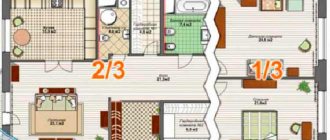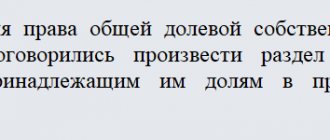How to redistribute shares in an apartment
Common property refers to the joint ownership of an object by several citizens. As a rule, common property arises when purchasing an apartment during marriage (joint property of spouses), during privatization, and during inheritance.
In such a situation, each of the owners is a full owner. However, disposal of the apartment is possible only with the consent of the co-owners. Each of them has no fixed share in the ownership. It is considered ideal (a multiple of the number of owners). 14 if there are owners, 1/3 if there are 3 co-owners.
The parties must initiate the process of allocating shares. During the separation process, each owner becomes the owner of a certain share. The size of shares is established by the parties independently (by agreement) or by the court. The size of shares can be revised at any time.
The law does not provide for the term “redistribution of shares in an apartment.” However, in practice, a number of transactions are provided, the result of which will be an actual change in the shares in the ownership of the apartment.
The issue can be resolved:
- On a voluntary basis (purchase and sale, donation, exchange, agreement).
- In court (forced redemption).
The procedure for redistributing shares in an apartment must be documented in writing. In addition, the document must be notarized. The process of transfer of rights must be registered in Rosreestr.
The law provides for a number of requirements for the redistribution of shares in the right of common shared ownership:
- absence of debts and encumbrances on the apartment;
- notification of all co-owners;
- execution of the transaction in writing;
- state registration;
- notarized certificate.
Letter from Rosreestr
Letter of Rosreestr dated 31.03.2016 No. 14-ref/04224-GE/16 “On notarization of an agreement on determining shares in the common property of spouses” (together with Letter of Rosreestr dated 10.03.2016 No. 14-ref/03029-GE/16, Letter The Ministry of Economic Development dated March 18, 2016 No. OG-D23-3321 “On consideration of the appeal”) brings clarity to the issue of division of common property acquired in a joint marriage.
In addition to the Family Code, Rosreestr also refers to judicial practice (Decision of the Supreme Court of the Russian Federation dated November 24, 2015 No. 18-KG15-203, Appeal Determination of the Moscow City Court dated July 28, 2015 in case No. 33-25275/2015), which confirms the fact that :
- spouses have the right, at their own request, to dispose of common joint property (part of it) acquired during marriage, on the basis of a marriage contract or any other agreement (agreement);
- an agreement on the division of property serves as the basis for the emergence, change and termination of the rights and obligations of spouses in relation to their property acquired jointly during marriage;
- The common property of the spouses can be divided between them by mutual consent in kind or in the form of shares.
Based on this, Rosreestr believes that the agreement on determining shares in the common property of spouses acquired jointly during marriage, along with the marriage contract, must be notarized (Articles 38 and 41 of the Family Code of the Russian Federation).
Also in the review of judicial practice on this issue, you can consider Resolution of the Plenum of the Supreme Court of the Russian Federation No. 10, Plenum of the Supreme Arbitration Court of the Russian Federation No. 22 of 04/29/2010 “On some issues arising in judicial practice when resolving disputes related to the protection of property rights and other property rights” . This Resolution of the Plenum contains similar arguments. In addition, the document resolves disputes about the rights to land plots on which apartment buildings are located, referring to parts 1-5 of article 16 of Federal Law No. 189 of December 29, 2004 “On the entry into force of the Housing Code of the Russian Federation” and part 1 of article 36 Housing complex of the Russian Federation.
Thus, this agreement will enable management organizations to correctly determine the spouses’ shares in the common ownership of real estate. Based on clearly defined shares, the management company will be able to correctly count votes at the general meeting of owners . This, in turn, will help management organizations correctly distribute the burden of responsibility for the maintenance of common property in apartment buildings between all owners of premises in a given building in proportion to their shares in the common property.
At the beginning of 2021, Rosreestr will post information in the Housing and Communal Services GIS from the state real estate cadastre and the Unified State Register
154000 .
Options
The law provides for the following options for the redistribution of shares in the right of common shared ownership of an apartment:
- Purchase and sale.
- Donation of a share.
- Exchange of shares using other property.
- Compulsory redemption by court decision.
- Agreement on redistribution of shares.
Example. Citizen P. and her 2 daughters are the owners of the apartment.
Each of them has the right to 1/3 share. As a result of the move, it became necessary to sell the apartment. Guardianship gives permission to deal with the property of minors only if they are provided with alternative housing. Citizen P. and her mother are also the owners of another apartment. 1/3 share in the first and 2/3 in the second. According to the agreement on the redistribution of shares, the mother and grandmother allocate 1/5 of the share to their granddaughters, 1/5 of the share remains with the mother and 2/3 of the share with the grandmother.
Sample agreement for distribution of shares
We, gr. residing at the address: , passport series No., issued, etc. , residing at the address: , passport series No., issued, are participants in common shared ownership of a land plot with a total area of sq. m. m with cadastral number, category of land, permitted use of the land plot, with the total area of sq. m located on it. m, outbuildings and structures, located at the address: , collectively referred to as the “Parties”, have entered into this agreement as follows:
- The specified land plot at the time of signing this agreement is in common shared ownership, is not encumbered by the rights of third parties, is not mortgaged, is not in dispute and is not under arrest (ban).
Agreement on redistribution of shares in an apartment
The agreement applies in cases where there is no dispute about the right between the co-owners. The law does not limit citizens’ right to redistribute shares in real estate. The procedure is carried out exclusively with the consent of the owners.
Important! If there are several owners, then the consent of only those citizens whose rights are affected is required. There is no requirement to obtain consent from persons who are not parties to the agreement.
An agreement is a document according to which the share of one of the owners increases, and that of the other decreases. As a result of execution of the document, the right of common ownership is terminated. Co-owners remain co-owners.
Procedure
The procedure for drawing up an agreement should be carried out in accordance with the following algorithm:
- Reaching an agreement with co-owners.
- Collection of documents.
- Paperwork.
- Transfer of payments.
- Notarization and state registration.
Although the procedure does not involve the termination of ownership of one party, each owner will incur significant costs. Moreover, the amount does not depend on whether the agreement provides for payment for the redistribution of shares or not.
Preparation of documents
The agreement is drawn up on the basis of a number of documents. Some of them need to be ordered in advance.
Documentation for the agreement:
- civil passports of the parties (passports of co-owners who are not involved in the transaction are not required to be presented);
- birth certificates of parties aged 0 to 13 years;
- documents of representatives of minor citizens;
- notarized power of attorney of representatives of adult citizens (if any);
- title documentation of each owner;
- extract from the Unified State Register of Real Estate;
- an extract from the Unified State Register of Encumbrances confirming the absence of encumbrances;
- information about the absence of debts for utilities;
- extract from the house register;
- registration certificate;
- documents for the land plot (if the apartment is located on the ground);
- information about payment of state duty.
If redevelopment has been carried out in the apartment, it must be legalized. In this case, the parties must obtain a new technical passport from the BTI.
Redistribution of shares in an apartment with illegal redevelopment violates the rights of the person who increases the share. If a decision is made to return the object to its original form, he will bear most of the costs.
If the apartment is located on land, then it is additionally necessary to draw up an agreement for the redistribution of shares in the land plot.
Formalization of the agreement
Expert opinion
Stanislav Evseev
Lawyer. Experience 12 years. Specialization: civil, family, inheritance law.
The agreement can be drawn up by the parties independently. However, it is advisable to entrust the drafting to a lawyer. To do this, it is necessary to provide the specialist with the original documents and wishes of the parties.
The law provides for the possibility of preparing a draft agreement by a notary. However, he only monitors the legality of the transaction. Therefore, the document may not reflect important points for the parties.
The document must contain the following points:
- Title of the document;
- information about the place of registration;
- date of conclusion;
- information about the parties, including passport details and place of registration;
- information about the apartment (address, area);
- initial sizes of shares;
- redistribution procedure;
- the possibility or gratuitousness of the transaction;
- procedure for payment of expenses;
- liability of the parties;
- moment of transfer of rights;
- details and signatures.
Sample agreement on the redistribution of shares in the right of common shared ownership of an apartment
Notarization
Transactions with shares in an apartment are subject to mandatory certification by a notary. The parties have the right to independently choose a notary office.
Important! The cost of services in notary offices is regulated by Regional Notary Chambers. However, they only set the maximum cost of the service. It is advisable to call nearby notary offices. Prices for services may vary up to 2,000 – 3,000 rubles.
The scope of a notary's activity exclusively includes checking a document for compliance with the law and certification. To receive technical services for project preparation, you must pay additionally.
Prices for notarization are formed as follows:
- State duty – 0.5% of the transaction value.
- Technical services (for example, in 2021 in Moscow - 11,000 rubles)
.
The rules of notary offices do not provide for the possibility of charging only state fees. Additional payments are also required.
Registration of rights
The transfer of rights to real estate is subject to mandatory state registration. The body authorized to collect and store information on real estate is Rosreestr.
Starting from 2021, the obligation to provide documents to Rosreestr for transactions that have been notarized is assigned to the notary. The specialist independently transmits all data to the authorized body.
Important! The parties do not take additional actions. However, the obligation to pay the state duty to Rosreestr remains.
The result of the application is the introduction of changes into the State Register. The parties are provided with extracts from the Unified State Register of Real Estate with updated data.
Protection of ownership of a land share
Briefly the essence of the matter:
Relatives of Ivanov and Petrov (surnames have been changed). In 2001, by a court decision, they received ownership of: Petrova 3/5 of the land plot and half of the house, Ivanov’s mother – 2/5 of the plot and half of the house. Ivanov inherited it from his mother. In 2002, Petrova and Ivanov annexed the neighboring plot, buying it from the administration and spending funds in shares (3/5-2/5), and in the same shares they registered the resulting plot as their property by agreement between them in 2006. In 2013 It dawns on Ivanov that the land should be divided in half, and he files it with the St. Petersburg district court.
And the first instance accepts in favor of Ivanov without blinking. Motivation – less than a page. And the decision: to recognize Ivanov’s ownership of the difference between half and 2/5, to terminate Petrova’s ownership of the difference between half and 3/5, to invalidate Petrova’s registration for 3/5.
Although in the comments everyone repeats with one voice that “ If the rights of common shared ownership have already been registered, it is impossible to redistribute the shares. The ratio of shares can only be changed by making a transaction: donation, purchase and sale, etc. “, as far as I know, there is no direct indication of this in the law (just as there is no direct indication in which case the court has the right to change the shares of co-owners). Let's say the court can accept the corresponding claim (clause 1 of Article 199 of the Civil Code of the Russian Federation), but only when there is a violation of rights. But even in this case, if the other party declares the application of a limitation period, due to the limitation period, the plaintiff must be denied (Clause 2 of Article 199 of the Civil Code of the Russian Federation). In this case, Ivanov’s rights were not violated; they are legal co-owners of the land plot (Petrova by court in 2001, Ivanov by inheritance in 2002; then both by registration in 2006). The court accepted the claim, Petrova declared the limitation period, the court ignored the limitation statement in its decision.
The court can oblige the parties to come to any agreement, but cannot redistribute (change) the shares so that one of them loses part of the property without compensation. The court cannot oblige co-owners to perform any actions (transactions) against each other or third parties if there is no violation of rights. The court decision does not say anything about the violation of his rights.
If the conditional Ivanov had the right to go to court, then only 4 options arise:
- vindication, but Petrova owned it by law;
— to challenge the registration of Petrova’s share of land. But the deadlines expired, his and her shares of the land were registered both in 2001, when they were established by the court, and in 2006, according to the statements of both, and were not challenged by him within the time limits established by law;
- file for violation of his rights to use land - suppose he was prevented from using a plot commensurate with his share. Prove this, and then the court would only oblige Petrova to remove obstacles to the use of Ivanov’s plot;
- sue for the division of the house and (or) plot, if he had previously approached Petrova about the division or allotment in kind and was refused (if they did not come to an agreement). Then the court would decide, on the basis of an examination, what and how to allocate to whom in kind, and at the same time who will compensate whom for what. If the established shares could not be allocated in kind and they would have to be redistributed, then the court would be obliged to decide on the amount of compensation for the one who increased his share - for the one whose share would decrease.
I believe that the application of the Land Code of the Russian Federation in this case is a controversial issue:
Court decision dated September 11, 2001. confirmed Petrova’s land share in ownership in the amount of 3/5. And it came into force before the Land Code of the Russian Federation came into force, i.e. until October 30, 2001 And throughout the 12 years of the RF Land Code, Petrova’s 3/5 share remained unchanged, her registration was not invalidated or disputed; the 2006 registration has only been confirmed. Article 7 Federal Law-137 “On the entry into force of the Land Code of the Russian Federation” : To land relations that arose before the entry into force of the Land Code of the Russian Federation, the Land Code of the Russian Federation applies to those rights and obligations that arise after its entry into force, with the exception of cases provided for by this Federal Law.
Inapplicable in this case, but interesting is Article 134 “Resolution of disputes between co-owners of individual buildings” of the RSFSR Law of 07/01/1970 “On approval of the RSFSR Land Code”, which became invalid only on 04/25/1991:
“Article 134. Disputes between co-owners of individual buildings on the lands of cities, workers, resorts, holiday villages and on land plots allocated by the executive committees of rural Soviets of People's Deputies in rural settlements about the procedure for using a common land plot are considered by the courts.
The procedure for using a common land plot is determined taking into account the parts of the building owned by citizens. The court may deviate from this rule in the case where the co-owners of an individual building have already established a procedure for using the land plot and changing it will significantly violate their interests.”
Also expired on December 21, 1993. Resolution of the Plenum of the Supreme Court of the Russian Federation dated December 20, 1983. No. 12 “On the practice of application of land legislation by courts”, but is often cited by courts and applied to relations that arose in the period 1983-1994:
"13. When resolving disputes about the procedure for using a land plot by co-owners of a building that arose after the procedure for using a common plot had previously been determined, the court should keep in mind that:
a) an increase by one of the co-owners of his share in the common ownership of the house by extension, superstructure or reconstruction is not grounds for increasing the part of the land plot in his use , since such a change in the procedure for using the plot can significantly infringe on the interests of other co-owners.”
In Article 37 of the Land Code of the RSFSR “Transfer of rights to a land plot upon transfer of ownership of a building and structure,” which was in force before the entry into force of the Land Code of the Russian Federation and, partially, until 2008, it was: “In the event of a transfer of ownership of a building, structure the specified rights to land are transferred to several owners, as a rule , in an amount proportional to the shares of ownership of the building or structure.”
Let’s blast the judge’s arguments in a childish way and more:
Clause 1 of Article 35 of the Land Code of the Russian Federation, given in full in the court decision, cannot be applied in this case. It talks about a “building” (i.e. the whole, and not shares of the building), located on a “foreign” land plot (the disputed plot is not “foreign” for Ivanov, but his property), it also talks about the transfer of the right to the building to several persons, in which, moreover, it is allowed to maintain the order of use of the site according to the established one, regardless of the size of the share in the house. But the main thing is that the court did not take into account that these provisions of Article 35 regulate not the establishment of shares in the ownership of a land plot, but the right to use the plot!
In practice, there is both good and bad, for some reason the good ones are often Rostov, Voronezh, and not the capital cities. Appeal ruling of the Voronezh Regional Court dated August 30, 2012 N 33-4426: “The statement that when the ownership of a building, structure, structure located on someone else’s land plot is transferred to another person, it acquires the right to use the corresponding part of the land plot, occupied by a building, structure, structure and necessary for their use, on the same terms and to the same extent as their previous owner, and in the event of transfer of ownership of a building, structure, structure to several owners, the procedure for using the land plot is determined taking into account shares in the ownership of a building, structure, structure or the established procedure for using a land plot (clause 1 of article 35 of the Land Code of the Russian Federation and clause 1 of article 552 of the Civil Code of the Russian Federation) is based on an incorrect understanding of the norms of land legislation that applies to land plots located for the use of the owners of the building, structure, structure , whereas in this case the land plot is owned by the parties (in equal shares, and the current procedure for use violates the rights of one of the co-owners).”
It is impossible to apply Article 35 of the Land Code on the transfer of rights also because, according to paragraph 2 of Article 13 of 122-FZ:
“State registration of the transfer of the right to an object of real estate, its restrictions (encumbrances) or a transaction with an object of real estate is possible provided that there is state registration of previously arisen rights to this object in the Unified State Register.” Petrova’s land shares allocated to Ivanov by a court decision did not constitute a separate object.
Next in italics are the judge’s pearls:
In accordance with Art. 28 of the Land Code of the Russian Federation, the size of the share in the ownership of a land plot is determined in proportion to the ratio of the area of the corresponding part of the building, structure or structure to the total area of the building, structure or structure.
But: Article 28 of the Land Code of the Russian Federation not only regulates “Acquisition of rights to land plots that are in state or municipal ownership,” but there are no such words in it at all!
The court found that no agreement was reached between the plaintiff and the defendant on determining the shares in the ownership of the land plot. – Shares in the ownership of the site were registered under a 2006 agreement between them, as evidenced by their applications submitted for registration of shares. Subsequently, Ivanov did not contact Petrova (like, officially) with an agreement to change shares.
In accordance with the above legal norms, taking into account their relationship with Art. 245 of the Civil Code of the Russian Federation, the court believes that the shares of the plaintiff and the defendant in the ownership of the disputed land plot must correspond to their shares in the ownership of the residential building located on this land plot. – There is no connection here, because under Article 245 “Determination of shares in the right of shared ownership”, by agreement of all participants in shared ownership, a procedure for determining and changing their shares can be established depending on the contribution of each of them to the formation and growth of common property.
Their contribution to the increase in common property, which was carried out in 2002 (the plot was purchased and annexed), is precisely measured in shares of 3/5 to 2/5.
That is, a land plot with an area of 2013 sq.m. is disputed, and the procedure for its use has not been determined. – Not the order of use, but the right of ownership of a plot of 2013 sq.m. in shares of 3/5-2/5 was determined by agreement between them and registered in 2006.
And finally, completely everyday amateurish considerations.
If the redistribution of shares of a residential building could be followed by law an unlimited number of times by the redistribution of shares of the land plot under the house, then this would necessarily be regulated by the provisions of the law. There is no such provision in current legislation. OTHERWISE, SINCE THE OWNER IS PRACTICALLY NOT LIMITED BY THE AREA OF POSSIBLE ANNEXES TO THE HOUSE (with the permission of the co-owner and within the boundaries of the site, subject to compliance with the norms), THERE WOULD BE A COMPETITION - WHO WILL ADD THE BIGGEST AND THUS CAPTURE MORE LAND. At least the whole area is built up.
If their land shares had been allocated in kind and registered to each individual, Ivanov would hardly have mentioned redistribution. But it is impossible to isolate in kind what is currently available, so that it would be of interest for purchase by an outsider. In addition, the house, which is not divisible in kind, in this case cannot be alienated without Petrova’s refusal to purchase her share of the house and land.
The law does not stipulate the “Ivanov incident” because then everyone would push their sharecroppers off the land with legalized additions. On the other hand, Petrova has the right to give him her entire share in the residential building (rent, sell), but keep the land for herself. In all cases, this will be an agreement between them, and the state has nothing to do with it.
Is this enough to seal the appeal? Are there any comments?
Expenses
The final cost of registering the redistribution of shares in an apartment depends on the number of stages required. Prices for services may vary throughout the country, as well as depending on specific companies.
Estimated cost of redistribution of shares
| No. | Stage | Price |
| 1 | Legalization of redevelopment (already done) | from 35,000 rub. |
| 2 | Re-registration of the registration certificate | from 10,000 to 20,000 rub. |
| 3 | Drawing up a draft agreement | from 3,000 rub. (on our website) |
| 4 | Notarization | 0.5% for state duty and from 6,000 rub. for technical and legal services |
| 5 | Registration in Rosreestr | 2,000 rub. |








